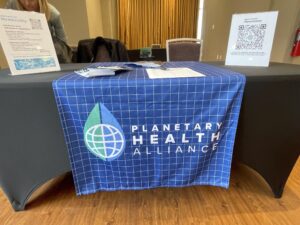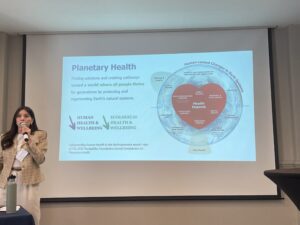
Planetary Health Frameworks
• Foundational Documents
News
When the opportunity presented itself to join our friends from the Johns Hopkins Institute for Planetary Health (JHIPH) (who are celebrating their first anniversary!), in person at the Sustainability Symposium in Baltimore, we jumped at the chance to connect with other passionate faculty, students, staff, and researchers dedicated to implementing a holistic vision for a healthy, just, and sustainable future. Please enjoy this event summary jointly crafted by communications staff at PHA and JHIPH, and we hope you, too, might find encouragement and strength by participating in other upcoming events in the global Planetary Health community.
Of course, we heartily recommend the Planetary Health Annual Meeting.
The Johns Hopkins 6th Annual Sustainability Symposium brought together a concentrated community focused on human-caused environmental impacts. This year’s event, for the first time, featured four panels on Planetary Health and emphasized advancing innovative practices and advocating for impactful policies. The full day of concurrent sessions spanned interventions from environmental humanities to urban planning and included panels on innovations like floating offshore wind farms, microplastics research, biogas harvesting, and artificial intelligence (AI) for identifying climate tipping points. A lunchtime talk was given by Maryland Secretary of the Environment Serena Coleman McIlwain. Research posters and informational tables (where PHA and JHIPH participated) complemented the formal sessions, providing attendees with opportunities to engage directly with researchers and organizations working on sustainability initiatives across the Johns Hopkins community.

Chris Lemon, Faculty Co-Director of Clinical Programs at JHIPH, opened the panel session on Greening Healthcare: Clinical Practice & Planetary Health with a compelling discussion on the importance of integrating environmental considerations into clinical practice. He emphasized that healthcare facilities often find themselves in a dual role—as contributors to environmental degradation and as entities vulnerable to its consequences. Lemon highlighted several innovative practices at Johns Hopkins, including rigorous waste management protocols and the adoption of green technologies across operations. These efforts, he explained, go beyond reducing the institution’s carbon footprint; they also aim to improve patient outcomes by fostering a healthier environment.
“Our commitment to sustainability is demonstrated through these initiatives,” Lemon remarked, “because caring for our patients means caring for the environment that sustains us all.”
Education emerged as another key theme of the symposium. Participants emphasized the critical importance of Planetary Health as an interdisciplinary field, underscoring the need to educate future generations about the impact of environmental conditions on human well-being. Building on the Rockefeller Foundation’s 2015 report that introduced Planetary Health as a distinct discipline, attendees noted its growing prominence: a review of 10,000 courses at Johns Hopkins University found that 702 included relevant content. A medical student, Jessica Mo, presented the Planetary Health report card initiative, a global effort that evaluates how health profession schools are incorporating Planetary Health into their curricula. Mo shared insights into both the challenges and progress of this initiative, explaining that by creating a metric-based evaluation system, institutions are motivated to continuously improve their educational approaches. “This ensures that future healthcare professionals are equipped to address the environmental impacts on health,” she noted. Her presentation highlighted how education can serve as a transformative tool in advancing Planetary Health, inspiring institutions worldwide to prioritize sustainability in their training programs.
Megan Latshaw, Faculty Co-Director of Education Programs at JHIPH, focused her discussion, Shaping Planetary Health Policy: Governance and Advocacy for a Sustainable Future, on the role of policy in driving meaningful change within healthcare systems. She illustrated how strategic policies can serve as catalysts for aligning healthcare operations with broader sustainability goals. Using the Transit Equity Policy as an example, Latshaw demonstrated how discussions can be translated into actionable policies that reduce environmental impacts while enhancing community health services.
“Policies like these show how healthcare can lead by example,” she explained, emphasizing that systemic change requires collaboration between policymakers, healthcare providers, and community stakeholders.”
During the Planetary Health Principles for Urban Planning session, panelists underscored how transformative city design can foster both human and environmental well-being, emphasizing concepts like 15-minute neighborhoods, regenerative building practices, and equitable community engagement. Speakers highlighted the urgent need for mindset shifts in teaching, advocacy, and business strategy to address the root causes of overbuilding and habitat loss, while simultaneously championing local entrepreneurial ecosystems that keep talent and innovation in Baltimore. They stressed the importance of robust data—particularly regarding energy use—to guide community-focused initiatives and noted that schools and other cultural assets play pivotal roles in drawing people to urban centers. Seydina Fall, Faculty Co-director of Innovation and Implementation Programs at JHIPH, unified these priorities under the concept of Planetary Health Cities and invited attendees to the Planetary Health Cities Symposium on June 16, where further discussions will explore principles for building more sustainable and livable cities of the future. Throughout the symposium, speakers consistently stressed the value of practical solutions and collaborative efforts to address the intricate connection between health and environmental sustainability. Each session showcased tangible opportunities for incorporating Planetary Health principles into everyday clinical routines and academic instruction. By highlighting the role of diverse stakeholders—from educators and clinicians to policymakers and community partners—the presenters illuminated a pathway toward systemic transformation that benefits both human health and the environment.
The symposium concluded with a resounding call to action for continued innovation and collaboration, a sentiment that resonated strongly with Jessica Kronstadt, Program Director of PHA, as she reflected on the first anniversary of JHIPH. Kronstadt was energized by how thoroughly Planetary Health was woven throughout the program, from policy-focused panels to reimagining urban spaces, and especially appreciated the diverse range of initiatives—such as incorporating Planetary Health into JHU classrooms and supporting student-led projects addressing pollution in Latin America.
As more health, education, and governance structures transform to confront their roles in stewarding Earth systems, it becomes clearer that embedding Planetary Health into all facets of society is imperative. The insights shared by Lemon, Mo, Latshaw, and others exemplify evolving leadership that is forming in institutions worldwide seeking to mainstream Planetary Health in operations and practice. During his remarks, Lemon captured this sentiment perfectly: “We are tasked with the responsibility to not only care for our patients but also the planet that sustains us all.”

Planetary Health Frameworks
• Foundational Documents
